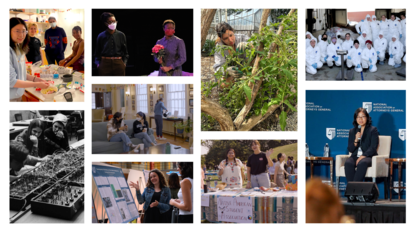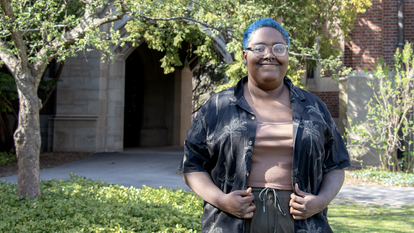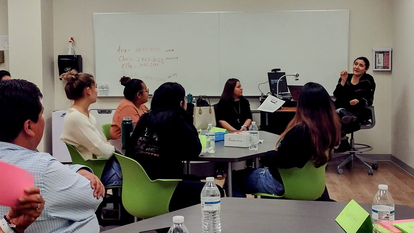
Happy First Day of (Remote) Classes, Wellesley!
Classes at Wellesley are underway again after spring break, but for the first time in College history, students and faculty are logging in from across the country and around the world, not walking into classrooms in Founders, Pendleton, or the Science Center.
Over the past two weeks, faculty, Library & Technology Services (LTS), and the Pforzheimer Learning and Teaching Center (PLTC) formed a remarkable partnership to facilitate the College’s transition to remote instruction, in response to the COVID-19 pandemic. As a result, more than 300 faculty members have been trained on Zoom videoconferencing and have been hard at work transforming their coursework to make it accessible and engaging for students.
K.E. Goldschmitt, assistant professor of music, is doubling down on the creation and use of podcasts in their History of Jazz class. This is something they have done before and students have responded well to, so now Goldschmitt is going “all-in” with it. “What I like about the format is that I can really focus on aspects of the music that link to broader course themes, and I’m allowing my students to respond creatively to what is happening around them, either by making music or their own podcasts,” they said.
Goldschmitt is also planning some listening parties that will happen asynchronously, outside of Zoom, where students can talk about their reactions to certain tracks via a Slack channel, and will set up times when both sections can meet for at least 30 minutes, twice a week, to talk about music to build connection among the students.
“I have always valued the discussions that Prof. KG facilitates in their classes. They are really very talented at guiding students through topics that are difficult to discuss in large groups, while allowing students to feel as though they have agency over their thoughts on the matter,” said Katie Hodges ’20. “KG is working hard to recreate across the world the feeling of closeness and comradery that arises in their classroom.”
Figuring traditional term papers wouldn’t work well under the current circumstances, Goldschmitt also sent out a Google form asking students if they have access to a musical instrument and privacy at home. Enough of them answered “yes” for Goldschmitt to allow students to make music for their final exams; one student is even proposing an EP.
“Obviously this is not how any of us planned or wanted this semester to end, but I’m incredibly proud of how our community has responded.”
Clara Shanabrook ’23
“I am thrilled to be making my own music instead of a final research paper for Professor Goldschmitt’s class,” said Eve Elkort ’22. “Their open-mindedness toward different styles of learning is one of my favorite aspects of the course.”
In addition to exploring alternative models of course formats, some faculty are also shifting their course content to focus on COVID-19.
Catia Confortini, associate professor of peace and justice studies, has family in Lombardy, the region of Italy that registered the first cases and the most infections in the country. She has adjusted her Global Health Governance curriculum to follow COVID-19 responses.
“It seemed irresponsible to continue ‘business as usual’ and not make the class relevant to students’ lives in very concrete ways,” Confortini said. “These weeks will be a real-time laboratory in which we investigate different aspects of what is going on right now.”
The students will be divided into six pairs, each following a different country and the World Health Organization, and will examine the detection and progression of COVID-19, how countries reported the first cases, and the extent to which they collaborated with each other and with the WHO in responding to the pandemic. They will also draw comparisons with the Ebola crisis of 2014, consider if the world learned anything from past lessons about pandemics, and host internationally recognized global health experts on Zoom calls throughout the semester. At the end of the semester, the students will collectively produce a zine on lessons learned and policy and governance recommendations for the future.
“I really appreciate all of the work Catia and my other professors have put into adapting syllabi for online learning, and I’m excited that our class will still be doing lots of group work and discussion using Zoom,” said Megan D’Alessandro ’21. “Redesigning this class was a collaborative effort that Catia involved us in and that will allow us to both educate ourselves and express our own analyses of global health responses.”
“On a personal level, I know that my current experience and future recollections of the COVID-19 pandemic will be intensely affected by having been a part of this class,” said Clara Shanabrook ’23, a student in Confortini’s class. “Obviously this is not how any of us planned or wanted this semester to end, but I’m incredibly proud of how our community has responded.”
Stay tuned for more stories about remote teaching and learning this semester.



